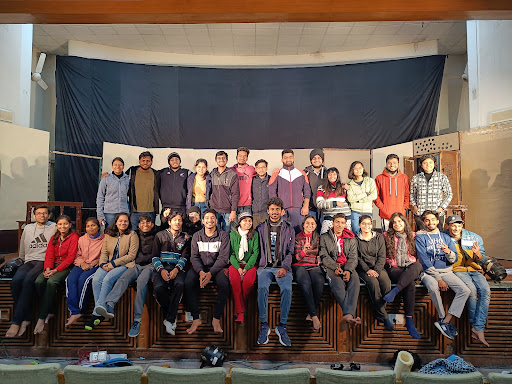

Body of IITR

Watch Out! had a chance to interview the dramatics section about their upcoming play “Khamosh! Adalat Jaari Hai,” which the section is going to perform on the 21st of December at the OP Jain Auditorium at 8:30 PM.
The synopsis of the play goes as follows:
Khamosh! Adalat Jaari Hai is an adaptation of Shantata! Court Chalu Aahe, a Marathi play written by playwright Vijay Tendulkar in 1963. The story begins with a group of people, who are planning to stage a play in a village. Since one of the cast members doesn’t show up, a local is asked to replace him. The story takes a twist when play-pretend suddenly turns into a grim charge as lines are blurred between reality and fiction. Unfulfilled desires, gender discrimination, redundant social customs and the sources and manifestations of power emerge in this gripping drama.
Here are a few excerpts from the session.
WO: Given the very “meta” nature of the play, in the sense that you guys play characters playing characters. How did you guys deal with the fact that you are playing a play in play? How was the experience?
Director: Everything started with a play but as things unfolded certain secrets came up that changed the entire course of the story. The beautiful thing about this play is there are eight characters involved and all eight of them are present on the stage throughout the course of the play. The most difficult character I found to direct was the lawyer, who isn’t a lawyer by profession but is just focused on prosecuting someone.
Cast: Playing characters inside the play was very challenging. We have people who over act in real life and then we have people who over act on stage. But playing an overactor on stage playing an overactor was both challenging and interesting at the same time.
Essentially we’re playing 2 characters in the play. We focused a lot on the contrast in our voices, facial expressions and body language. The audience has to be able to distinguish between the character that we’re playing and the character that the character is playing. The whole process was difficult, but we were helped by our seniors throughout the course of the 21 days we were here.
Our directors helped us too in understanding what we should expect from the characters, what these characters should expect from their characters (as these characters are actors inside the play) and the improvisation that we need in order to play these complex characters.
WO: This was an offline play after quite a very long time. How was your experience putting up and preparing everything? How are things different from what it used to be during lockdown?
Drams: The experience was great, it was fun setting up everything from stage to dialogues. Things are a bit different as we’re short of first year right now so fourth yearites are trying to give us their time. In general, during lockdown we missed sitting with each other discussing the plays and scripts. During lockdown we did organise plays but since those were online, dialogue delivery was the only thing that mattered. Here, on an actual stage, it becomes important to work on our body language, in accordance with the dialogues. Along with that, we have to set up the stage ourselves. Each element of the experience - lights, music, placement of props et cetera, has to be prepared and checked. Online had its set of different problems, and like always, with everyone’s help we are able to keep up with all the challenges that came.
WO: For sophomores this was their first on stage play. What was their experience like?
Drams: Our last play which was online, we didn’t quite have an idea how long it takes to prepare and set everything up. We used to attend meetings for as long as possible and then some or the other thing used to come up and people used to leave. However, here on campus we were compelled to spend time in the auditorium. As the preparation went on, the time we spent in this auditorium gradually increased. We understood the importance of time, and made a lot of memories during the course of preparation.
WO: Why this play? What resonated with you when you chose this play and why?
Director: It was after reading a lot of scripts and plays we stumbled upon this play. We found it really gripping and were quite sure that this is something we can show our campus audience. Even though the play dates back 30-40 years, the audience will be able to relate with all aspects of it.
Cast: As members of the cast, we felt the play is somewhat satirical. Themes like the glaring power divide that exists between men and women, and how that power is used to ensure that women are not respected in the way they deserve are addressed. The characters present in the play can still be found in our society and thus the play is timeless in that way.
WO: Is there anything that you want the audience to look out for? Any messages or easter eggs that would enhance their experience?
Director: There are no easter eggs as such, just be attentive during the play. We assure you, if you pay attention to what’s going on and what’s being said, you’d be able to enjoy the play. We also recommend you to pay close attention to the verdict.
WO: What kind of other works can we expect in future?
Director: Stage and street plays are our forte but we are not going to shy away from exploring. We did explore with the online play earlier this year and we’re organising a mime act soon. For those who are waiting, we’re also planning to organise the Friends of Section as soon as we get required permissions from the authorities. Just stay tuned for what’s to come!
Watch Out! also got to interview the cast and director of ‘Be Your Dream’, a mime act which they are going to perform at the MAC Auditorium two days after the stage play, on the 23rd of December at 6 PM. Here are a few excerpts from that interview:
WO: Starting from the basics, what exactly is a mime act?
Drams: Mime is an act wherein you are not allowed to speak, it’s your body language and expressions that convey the entire story and emotions. Traditionally it’s around 10-15 minutes long, but we wanted to make it a little longer, so around 20 minutes.
Much like street plays, there are no props involved in the act, rather we have to become the props. From the table to the chair to the beds, it is the cast members who play each part.With dialogues absent, the acting, music and makeup take the front seat in the success of the act.
WO: What does your act revolve around?
Drams: Our act aims to depict the life of a student at IITR. The freedom one obtains, the different career opportunities, the thoughts one has before coming to IITR and how they change after coming here. Overall, it depicts how one grows here as a person.
WO: With this being the first shot at a mine act for all of you,what was your entire experience like?
Drams: As things have been, we are short of the first year, who’d usually make one fourth of the section. Also, the members performing in the mime act are the non-cast members of the stage play a day before, and have to look after those responsibilities at priority. Thus the cast for this play gets little time to practice. But even with that, we’ve tried our best to put up a great show.
The thing about a mime act that makes it the most fun act out of all the different kinds of plays is that there is no fixed script. Every person has to come up with new ideas everyday, and thus we keep improving our act constantly. Also, as we are not allowed to communicate via speech, our actions are much more significant. Each movement we make should be clearly understood by the audience. The act is both difficult and entertaining, but we are enjoying ourselves a lot.
WO: As you mentioned mime is about expressing yourself via emotions and body language, so how was it learning to express yourself without dialogues?
Drams: As we’ve told you before, one needs to be extra careful about the fact that the audience should understand everything. If people lose track of the plot at any point of time,it might become very difficult to catch up. Because of this, every action we do needs to be exaggerated. Even the simplest of actions, like eating an apple or opening a laptop, has to be performed in such a way that each and every person sitting in the audience knows what’s happening. Taking care of this was a challenge that we took on, and tackling it was what made the preparation fun.
WO: During the course of one’s journey at IITR, a student experiences a multitude of emotions. How difficult was it for you to capture all of those emotions and depict it out without dialogues?
Drams: There are three prominent things that deliver the entire scene: the hands, the legs and the facial expressions. So every emotion is depicted using just these three elements. It was difficult for us to perform all actions as without dialogues we needed to exaggerate every scene. There are many emotions, many experiences which need to be covered. There are different types of students, each with different experiences, capturing all those emotions was indeed challenging . A show is successful when the audience can relate to it, and thus we’ve tried our best to depict as many aspects of one’s life as possible and also to make it relatable.
WO: You guys have performed many stage plays and now you’re performing a mime. What would you prefer between the two?
Drams: The thing about stage play is, it is entirely scripted. So for every action there is a particular way one is supposed to perform. Each action has a timing. However in Mime you create scenes and with every scene there is a lot of room for improv. Thus the openness you get with mime is more than what you get with stage plays or street plays.
Being part of the section, for us it’s not a matter of preference, but a matter of what we need to do. Our aim remains to capture the audience. The medium, whether it is a stage play, a street play or a mime act, is irrelevant until we can fulfill the goal.